
A Rainbow of Unity
- Art & Design
- |
- 05 December 2020
- Priya Kumari Rana
As Delhi’s second Rainbow Literature Festival kicks off in a digital format, Festival Director Sharif Rangnekar tells us about the panelists and the voices they bring to the queer and heterosexual community, and the important takeaways from this fest.
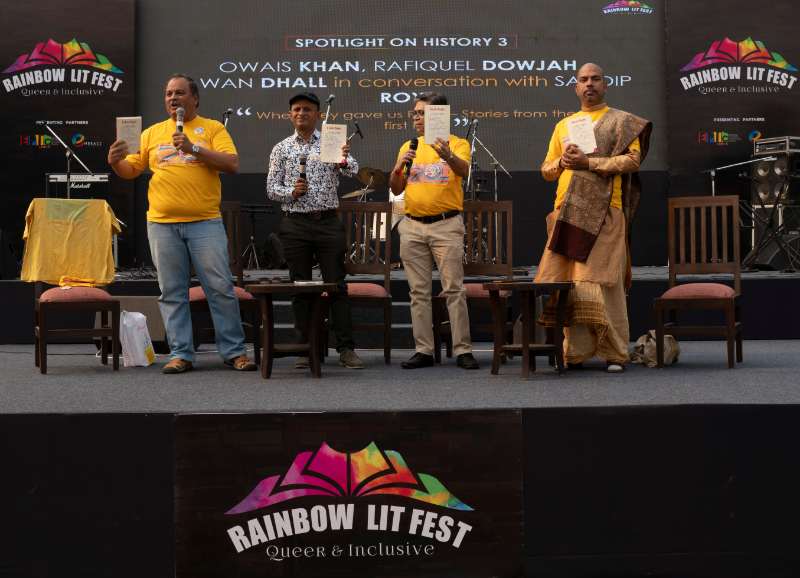 The Reunion of India's first Pride Walk organisers after 20 years at last year's Rainbow Lit Fest
The Reunion of India's first Pride Walk organisers after 20 years at last year's Rainbow Lit Fest
It’s been one year since the Rainbow Literature Festival’s journey began, the very first queer and inclusive literature festival organized out of New Delhi. This weekend – December 5 and 6, because of the pandemic, the festival goes online in a special two-day event called Digital & One. Opening with a speech by politician Shashi Tharoor (the next day opens with a talk by scholar Bibek Debroy), the event will see the coming together of over 50 leading authors, poets, activists, scholars, filmmakers, artists, performers and business leaders to discuss topics as varied as representation, identity, poetry and social justice, mainstream cinema, puppeteering, and much more. Festival Director Sharif Rangnekar speaks to us about launching a lit fest in the midst of the pandemic, and how he hopes it will help the queer community find its own authentic voice both within and outside the community.
What’s been your aim – for the Rainbow Lit Fest, in the past and now?
The Fest is queer and inclusive – the majority is queer and the other part is for the heterosexuals. We want to engage with the reality of where we are, and find commonalities when it comes to certain issues. Supposing you are discussing race and racism, caste and class, or colour, this becomes an issue not just within the rainbow, but outside – if you are talking about say, domestic violence or issues against women. It affects people on both sides of the rainbow, and there are lots of similarities. If you look at careers and aspirations, and look at what kind of jobs should be available – that also matters to us, because it matters to all human beings. It’s these intersections we look at. That is where the genesis came from – that is why the context of the festival is queer and inclusive.
Often, for a minority, there’s a real risk, a tendency to believe that we are the only ones with a specific problem, so one mentally isolates oneself. The fear that you have only gets accentuated. It happens to many minorities, and it also happens to women.
Last year (December 2019) when we had Shubha Mudgal, if you look at ragas, or singing in a defined box, people wonder what does it have to do with the queer community. But when you see that there were ragas that were sung only by men, and women broke that path, it matters to us. When you look at Shubha Mudgal, she was trying to break the mould as a singer, and for the views she carries and the stories in her book (Looking for Miss Sargam: Stories of Music and Misadventure). The same goes for Nandita Das, who started her career with Fire; she also talks of colour. We have so much within our community, and we don’t have sufficient platforms.
So this is your second Lit fest?
On December 7, we complete one year. We expected to have a physical fest like we did last year, but with Covid it’s just not possible. That is the worst kind of common ground! In between, we had a short film – Breaking Notions, with 15 people, released on the International Day Against Homophobia, Transphobia, and Biphobia – on May 17. We had Sunita Rao, Devdutt Patnaik, and Rahul Vohra, telling us why stories are important, why they must be told. Then we held the Rhyme & Reason poetry competition in June. You can’t replicate a lit fest, digitally. That is why we call ours Digital & One, because it’s a sub-property of the Rainbow Lit Fest. We’re celebrating that we were there last year, and we will be there next year. We need to be asking ourselves questions about unity and how much solidarity exists in our community. We have to find ways to get together. This comes from the Sanskrit word ‘ekam’, which means unity. That is where we were coming from.
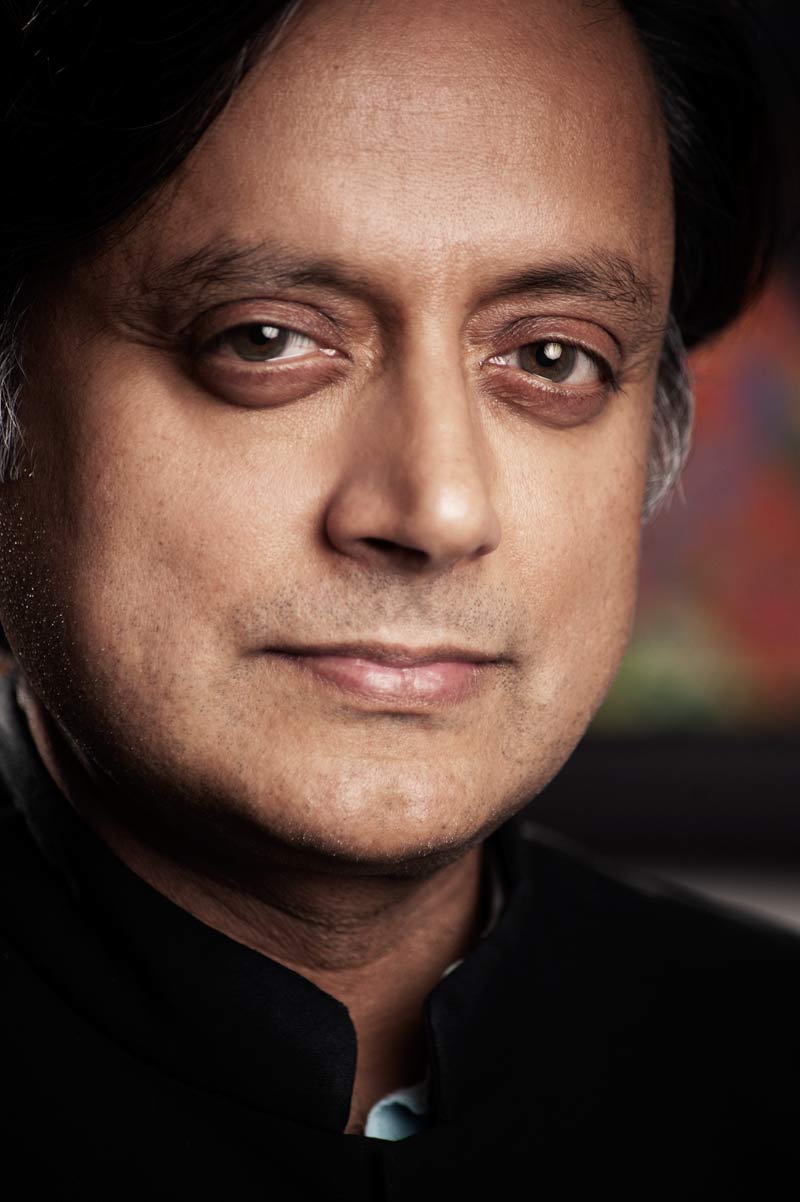 Dr Shashi Tharoor
Dr Shashi Tharoor
Getting Bibek Debroy and Shashi Tharoor as opening speakers has been quite a coup…
Coup is the right word! By the end of October I had 50 speakers, including Dr Debroy and Dr Tharoor. Dr Tharoor has been vocal about the community since the beginning, against article 377, and especially since he’s worked for human rights in the UN, you expect him to speak about rights. It took less than two days for him to respond that we were on for the Fest.
 Dr Bibek Debroy
Dr Bibek Debroy
As for Dr Debroy, he holds the Limca Book of Records for translation. Both are political but appear to be apolitical as human beings. They may support something or be critical, but they have the dignity of a conversation of that’s what we desperately need more of. Dr Tharoor has never addressed a queer-centric group before. Dr Debroy has not spoken on the community – only as economist. It’s a huge deal; it’s historic. It struck me that here were two people with different political leanings and from two divergent political parties. I am still excited and overwhelmed. Our panel is stronger than last year. Between December last year and now, the Fest has grown in terms of the kind of people we have.
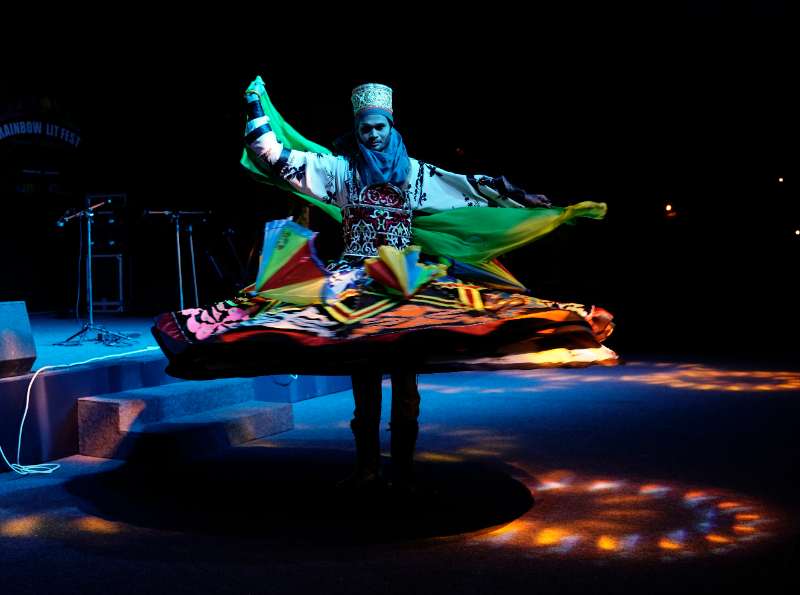 A Sufi performance at the Rainbow Lit Fest last year
A Sufi performance at the Rainbow Lit Fest last year
Was it easy to get this range of panelists and performers?
I reached out to them, no one knew that it would be digital. And I only announced the digital festival once I was sure of people’s participation.
So when you are looking at journalist Sandip Roy and human rights activist Anjali Gopalan – they are extremely important persons to have on the panel that explores the idea of community on Day 2, Then to Now – Better to Bitter, Singular to Plural.
I’ve put together all the topics, and the one on love, Love is a Many Splendoured Thing, is close to my heart, because I’ve spent so much time, from the time I came out – I am now 52 – from a period where it was very difficult to find someone. So when I hear about three couples from different locations, different backgrounds – like Mumbai-based Sridhar Rangayan and Saagar Gupta’s story, or Raga Olga D’Silva and Nicola Fenton – I just love love! Just to see couples happy, people happy; it may sound cheesy.
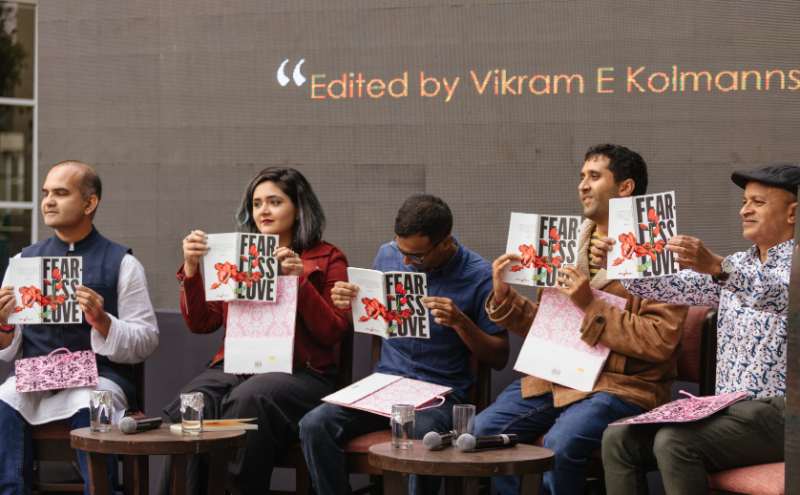 The Launch of Fearless Love The Anthology at last year's Rainbow Lit Fest
The Launch of Fearless Love The Anthology at last year's Rainbow Lit Fest
The motif – the mainstreaming of the queer identity – why is this important? Is there a fear of losing one’s identity?
There is a fear – it’s genuine. Mainstream has been a criminal. It’s a real problem. Even for the heterosexual world, a lot of people feel oppressed by the mainstream, when you look at music or cinema, it’s dominated by Bollywood and silences the other voices. When you look at what you study, and what you should not, and what your career should be or what you consume, it’s a mainstream dialogue – it has less to do with you, and more to do with what can be sold. So when it comes to the queer community – the heterosexual world carries a gaze – they just believe that we should be like them. They don’t have an idea, that equality is about choice, not about you. It’s not necessary that the dignity of a person should revolve around marriage., It’s not about a multi-national company or a private sector company, they may want to do something else. Is there space for that? That is where this comes from.
If you look at mainstream depiction of queer people – like caricatures that haven’t gone completely – there is an assumption that every male, every gay man will be like a woman. When we look at the press, when they reported Pride, the tendency was to report on people wearing masks, or who were flamboyant. For us it’s normal, it’s not flamboyant. They are so scared even today to reveal their identities, so that’s why they kept the mask. That is the problem with the mainstream. Will you become the way they want you to be? Because you want a place there. In the first panel on pop culture, film director Onir stood his ground, he didn’t get the kind of money he could have. He hasn’t mainstreamed. Look at Sushant Digvikar, he is probably the only gay pop star we have, but he still does things on his terms.
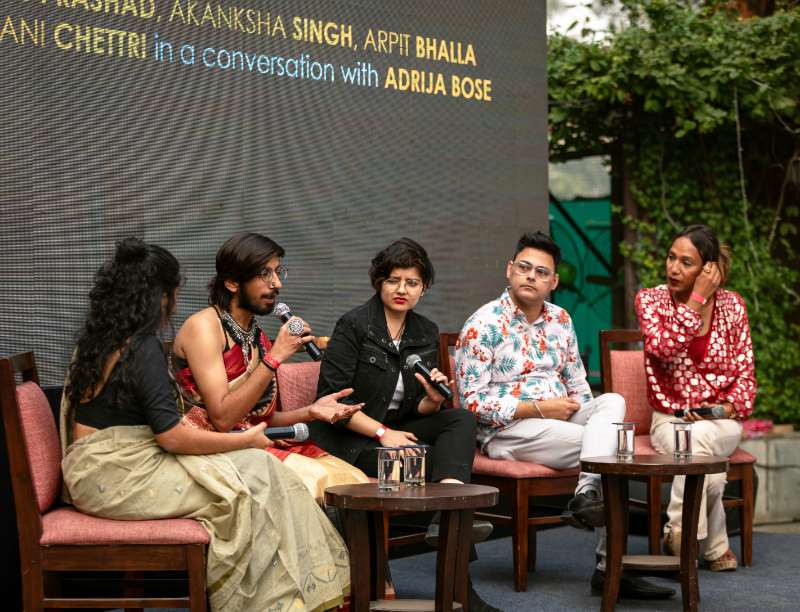 A panel discussion featuring Shivraj Prasad, Rudrani Chettri, Akanksha Singh, and Arpit Bhalla in conversation with Adrija Bose at last year's Rainbow Lit Fest
A panel discussion featuring Shivraj Prasad, Rudrani Chettri, Akanksha Singh, and Arpit Bhalla in conversation with Adrija Bose at last year's Rainbow Lit Fest
Films are being made that dumb down the trans community. Actor Rudrani Chettri is in an Oscar nominated film, and runs a modelling agency for the trans community. How can you not find her? We do need voices. We don’t want the current political leaders to be our representatives. We may want someone from our community who has lived life experience, who then will understand much better, our issues as our community.
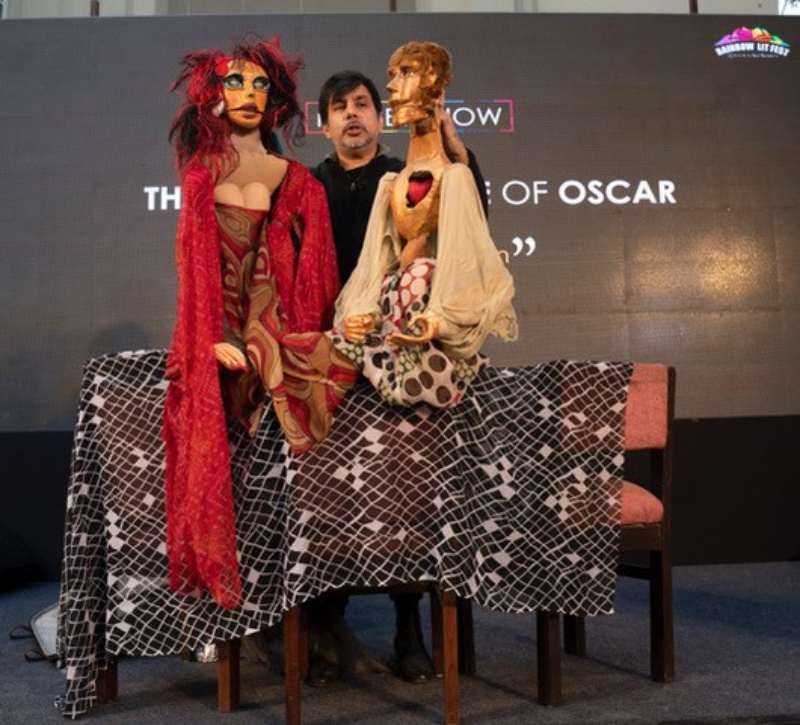 The Wilde fairy-tale of Oscar – A Puppet Show by Varun Narain at the Rainbow Lit Fest last year
The Wilde fairy-tale of Oscar – A Puppet Show by Varun Narain at the Rainbow Lit Fest last year
The slam poet Amani Saeed, and puppeteer Varun Narain, they will be performing live?
This will be all on Zoom, and some shows will be recorded. Varun is brilliant – he’s performed in Amsterdam. Last year, the theme was Oscar Wilde, this year, it’s Hans Christian – ‘And Her Sons’!
You’ve brought in global Indians and what they bring in, how do they help shape people’s perception in India and abroad?
It’s also the culture of South Asia that we carry in various parts of the world, and how we also bring things back from there. It’s about music, food, night places. Even Dhiren Borisa, who’s on the panel Diasporic Connections: Influences Over Space and Race. He’s a Dalit scholar, but his studies have been about urban spaces – for recreation, entertainment, or the underbellies of cities – that are queer. Whereas Kareem Khubchandani is a drag artist, professor, and performer, and author of a book called Ishtar. He has studied the drag movement and nightclub movement in Bengaluru and gone on to Chicago.
Filmmaker Neeraj tries to find ways of taking South Asian cinema into the British space, and creating an Indian space in the UK. He guides people here when they are making queer films, and also supports them financially, in Marathi and Hindi.
Cultural producer and curator Myna Mukherjee is well known in New York, and now in India, she’s curating art. At the Indian art summit, she was part of the queer section, and she’s also doing the South Asia Human Rights Festival that starts on December 10. So these are all people who are aggregating the different elements of Indianness globally and locally, with a queer touch, and they make no apologies of who they are.
India is changing, a festival like this would help broaden horizons. What are some of the takeaways for audiences at Digital & One?
If we can make people a bit more aware of themselves in our community, so that they get a sense of self, I would be happy. You need that awareness from outside as well as from someone who is like you. It would encourage more and more people, to share stories in whichever form they are comfortable with - through drag, poetry, or song. Keep telling the story, as we need to crowd the space with more and more queer content out there. We need to tell the world of publishing, that there is so much out there you need to fill up bookshelves with.
Lastly, I would like to add that we have made these ready reckoners, that are in the schedule – that are 2-3 minutes long. So Shaikat Majumdar will tell you what are the things to keep in mind if you want to be a great writer. Vivek Mansukhani will give tips on theatre, Seema Anand on storytelling, and Varun on puppeteering. We are placing them strategically in the festival, then later on our Instagram handle.
Register at Rainbowliteraturefestival.com
FOLLOW US ON INSTAGRAM
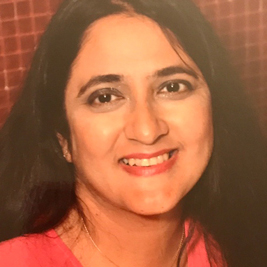
Lifestyle Insider is a kind of junction point, connecting people with diverse interests that touch on the more luxurious aspects of lifestyle – fashion, design, travel, food and spirits, art, watches and jewellery, cars, yachts, and aviation, and technology. People today don’t fit into boxes and categories. In our individual ways, we are interested in diverse themes, products, and the challenges that face our world today. You will judge how well this effort of mine caters to your passions and proclivities.
Lifestyle Insider is a showcase of all that is beautiful and luxe. Behind every creation, is a designer, chef, entrepreneur, or a design maison. I have delved into my own appreciation for objetsde luxe that I have admired over the years – be it a love of fashion from the world’s top Parisian and Italian fashion maisons and their ’90s muses, or the care that goes into sari and Indian textile collections in my own family. Growing up on four continents, as the daughter of a former Indian Ambassador, I’ve seen a remarkable array of historic places and met a myriad people. My aim is to bring my world view into this website, a curation of what I find particularly stunning, unique, and newsworthy.
It’s an exciting time for brands all over the world. With change comes opportunity. With the global ‘reset’ and uncertainty on many fronts, there is a chance to write a new script. Let’s be those pioneers.
A bit about me:
A luxury and fashion journalist with 25 years of experience in publishing and magazine journalism, I have edited some of India’s top fashion and luxury magazines. I got my BA in Comparative Literature from UC Berkeley, and went on to receive my Master’s in English and French from the University of Strasbourg, France. I have also studied German and Film. I live in Gurugram, India, and look forward to once again exploring our world with a new-found freedom.
Priya Kumari Rana
Founder and EditorContact Us
Mail us @ lifestyleinsiderindia@gmail.com






